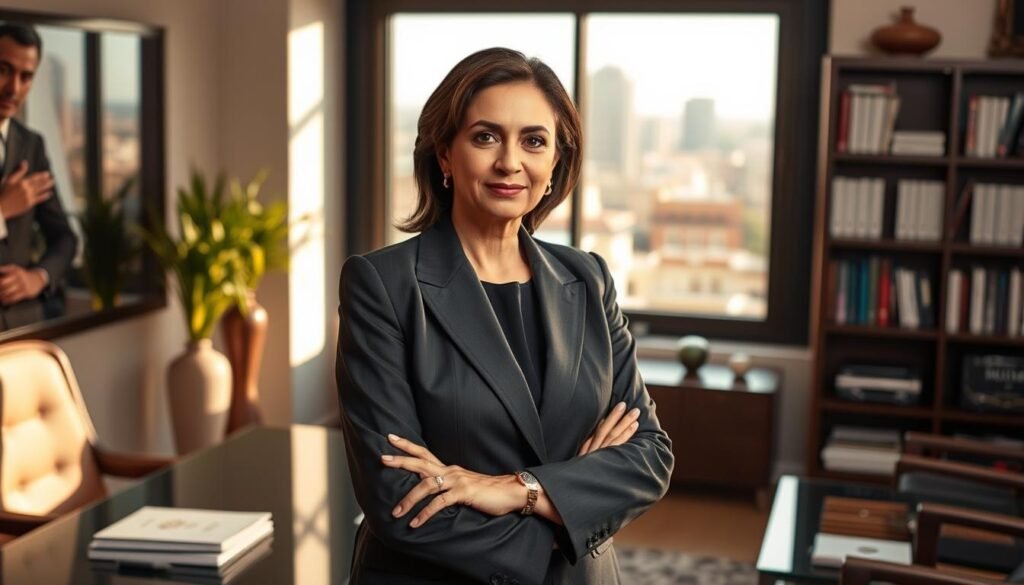What does it take to become one of the most influential female executives in Morocco? Miriem Bensalah-Chaqroun’s journey offers a compelling answer. Born in Casablanca to a Berber family with deep roots in business and activism, she carved her path as a visionary leader.
As the daughter of Holmarcom Group’s founder, she inherited a legacy of entrepreneurship. Yet, her achievements extend far beyond her family’s success. She made history as the first woman to lead Morocco’s General Confederation of Enterprises (CGEM), reshaping the country’s economic landscape.
Her leadership blends sharp business acumen with a commitment to social responsibility. Recognized by Forbes Middle East, she proves that corporate success and societal impact can go hand in hand.
Key Takeaways
- Pioneering Moroccan executive with global recognition
- First female president of CGEM (2012-2018)
- Key figure in Holmarcom Group’s expansion
- Advocate for economic reform and women in leadership
- Balances corporate strategy with social responsibility
Early Life and Education

The foundation of leadership often begins in childhood, shaped by family and education. For this moroccan businesswoman, both elements played pivotal roles in her rise to prominence.
Family Background and Berber Heritage
Born into a family of five children, she inherited a legacy of activism and enterprise. Her father co-signed Morocco’s 1944 Manifesto of Independence, embedding a sense of civic duty early on.
Berber roots influenced her leadership values—resilience, community, and pragmatism. Yet, traditional inheritance laws initially posed challenges to her succession in the family’s company, Holmarcom Group.
Academic Pursuits: From ESCP Europe to the University of Dallas
Her global perspective took shape at ESCP Europe, where she studied multinational business strategies. This training later fueled her ability to navigate cross-border ventures.
In 1986, she earned an MBA in international management from the University of Dallas. Specializing in finance, she mastered strategies to expand businesses across countries—a skill that defined her corporate governance roles.
Education didn’t just build expertise; it became the bridge between her heritage and her future impact on Morocco’s economy.
Career Achievements and Leadership Roles

Breaking barriers requires vision, and her career proves it. From reshaping Morocco’s business policies to steering global corporations, her leadership left an indelible mark.
Pioneering Presidency at CGEM: Breaking Barriers
As the first female president of Morocco’s CGEM (2012–2018), she transformed the group into a policy powerhouse. She modernized labor codes and secured CGEM’s observer status at the 2016 UN Climate Conference.
Her reforms bridged gaps between government and private sectors. Advocacy for fair wages and streamlined regulations became hallmarks of her tenure.
Global Influence: Board Memberships and G20 Participation
Her expertise extended to international board directors roles. She joined Eutelsat (2012–2017) and Renault (2017–present), advising on cross-continent strategies.
At the 2017 G20, she launched the Women’s Entrepreneur Finance Initiative. This program unlocked funding for African women-led businesses, amplifying her impact beyond Morocco.
CEO of Les Eaux Minérales d’Oulmès and Holmarcom Directorship
Leading Eaux Minérales d’Oulmès, she turned the water brand into a North African market leader. Innovative distribution and branding fueled its dominance.
As CEO of Holmarcom Group, she managed a $1.5B portfolio spanning insurance and aviation. Her direction ensured the company’s growth amid global competition.
Leadership Style and Industry Impact

Balancing corporate growth with social progress defines true leadership. This approach shaped her legacy as a powerful arab executive who transformed Morocco’s business landscape. Her strategies blended firm decision-making with inclusive dialogue, setting benchmarks for the region.
Advocacy for Women Entrepreneurs and Economic Dialogue
She championed gender parity, creating mentorship programs for woman-led startups. Her efforts placed Morocco on the map for initiative global funding, like the Women’s Entrepreneur Finance Initiative.
In corporate boardrooms, she pushed for equal representation. Over 30 female entrepreneurs credit her guidance for scaling their ventures across the sector.
Navigating Challenges: Labor Reforms and Business Climate
Her conciliatory style resolved the 2014 labor strikes through tripartite negotiations. The 2015 Labor Code amendments, which she spearheaded, streamlined hiring and wage policies.
As head of CGEM’s business Climate Committee, she bridged public-private relations. Renewable energy partnerships and Morocco-Spain trade deals emerged from her cross-sector collaborations.
Her leadership proved that economic growth and social equity aren’t mutually exclusive—they’re interdependent.
Conclusion
Global recognition follows those who merge business success with societal impact. Honored by King Mohammed VI and foreign governments, her awards—like the Order of National Merit and Spain’s Civil Merit—highlight her role in advancing global development.
An aviation license and Harley-Davidson rides symbolize her defiance of norms. As a director at Renault and Eutelsat, she continues shaping cross-border strategies.
France’s Legion of Honour and Forbes rankings cement her legacy. Her vision for African economic integration proves leadership isn’t just about profit—it’s about purpose.
FAQ
What is Miriem Bensalah-Chaqroun best known for?
She is recognized as a leading Moroccan businesswoman, serving as CEO of Les Eaux Minérales d’Oulmès and holding key roles in global organizations.
How did her education shape her career?
With degrees from ESCP Europe and the University of Dallas, she gained international business expertise that fueled her leadership in multinational companies.
What makes her leadership style unique?
She combines strategic vision with advocacy for women in business, driving economic reforms while fostering inclusive corporate growth.
Which global initiatives has she contributed to?
She actively participated in G20 discussions and served on boards like the Initiative for Global Development, shaping international economic policies.
What challenges has she faced in her career?
She navigated complex labor reforms in Morocco while balancing corporate growth with social responsibility in the beverage industry.
How has she impacted Morocco’s business sector?
As former CGEM president, she modernized business practices and strengthened Morocco’s position in African and global markets.
What recognition has she received?
She earned France’s National Order of Merit and Morocco’s Order of Civil Merit for her contributions to business and society.


